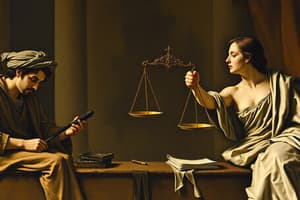Podcast
Questions and Answers
What is the essence of Rawls' theory of Justice as Fairness?
What is the essence of Rawls' theory of Justice as Fairness?
- It advocates for complete equality of outcomes.
- It is solely concerned with individual liberty.
- It promotes economic freedom over social equity.
- It emphasizes equal rights and fairness in distribution. (correct)
What is the Veil of Ignorance intended to ensure?
What is the Veil of Ignorance intended to ensure?
- That individuals have prior knowledge of social hierarchies.
- That individuals choose based on their own backgrounds.
- That individuals design a society impartially. (correct)
- That individuals prioritize their personal interests.
What does the Difference Principle allow?
What does the Difference Principle allow?
- Equal distribution of resources regardless of need.
- Inequalities only if they benefit the least advantaged. (correct)
- Inequalities that favor the wealthy.
- Maximization of individual freedoms without restrictions.
What is Fair Equality of Opportunity?
What is Fair Equality of Opportunity?
Which of the following best defines the Maximin Rule?
Which of the following best defines the Maximin Rule?
What are Primary Goods in Rawls’ theory?
What are Primary Goods in Rawls’ theory?
What is meant by Overlapping Consensus in Rawls' political philosophy?
What is meant by Overlapping Consensus in Rawls' political philosophy?
What does Political Liberalism advocate for in a pluralistic society?
What does Political Liberalism advocate for in a pluralistic society?
What does Public Reason emphasize in political decisions?
What does Public Reason emphasize in political decisions?
Which principle allows inequalities only if they benefit the worst-off in society?
Which principle allows inequalities only if they benefit the worst-off in society?
What does the term Reflective Equilibrium refer to?
What does the term Reflective Equilibrium refer to?
What is the main focus of the Justice as Fairness Framework?
What is the main focus of the Justice as Fairness Framework?
What is meant by the concept of Equality of Opportunity?
What is meant by the concept of Equality of Opportunity?
Which of the following best describes Intuitive Justice according to Rawls?
Which of the following best describes Intuitive Justice according to Rawls?
What does the Liberty Principle state?
What does the Liberty Principle state?
What does the term Comprehensive Doctrine refer to?
What does the term Comprehensive Doctrine refer to?
Flashcards
Justice as Fairness
Justice as Fairness
Rawls' theory of justice that emphasizes fairness in distributing rights and resources.
Veil of Ignorance
Veil of Ignorance
A hypothetical scenario where individuals design a just society without knowing their own advantages or disadvantages.
Original Position
Original Position
A theoretical social contract where individuals, behind the veil of ignorance, choose principles of justice.
First Principle (Equal Liberty)
First Principle (Equal Liberty)
Signup and view all the flashcards
Second Principle
Second Principle
Signup and view all the flashcards
Difference Principle
Difference Principle
Signup and view all the flashcards
Fair Equality of Opportunity
Fair Equality of Opportunity
Signup and view all the flashcards
Maximin Rule
Maximin Rule
Signup and view all the flashcards
Public Reason
Public Reason
Signup and view all the flashcards
Comprehensive Doctrine
Comprehensive Doctrine
Signup and view all the flashcards
Social Contract
Social Contract
Signup and view all the flashcards
Intuitive Justice
Intuitive Justice
Signup and view all the flashcards
Equality of Outcome
Equality of Outcome
Signup and view all the flashcards
Reflective Equilibrium
Reflective Equilibrium
Signup and view all the flashcards
Justice as Fairness Framework
Justice as Fairness Framework
Signup and view all the flashcards
Liberty Principle
Liberty Principle
Signup and view all the flashcards
Study Notes
Rawls' Theory of Justice: Key Concepts
- Justice as Fairness: Rawls' core theory, proposing two principles for a just distribution of rights and resources.
- Veil of Ignorance: A hypothetical situation where individuals design a society's justice principles without knowing their own personal circumstances, ensuring impartiality.
- Original Position: A theoretical social contract, where individuals rationally agree upon justice principles while behind the veil of ignorance.
- Two Principles of Justice: Rawls' fundamental ethical principles:
- First Principle (Equal Liberty): Guarantees equal basic liberties for all individuals.
- Second Principle: Social and economic inequalities are permissible only if they benefit the least advantaged and are attached to positions accessible to all under fair equality of opportunity.
- Difference Principle: Allows inequalities only if they improve conditions for the least advantaged.
- Fair Equality of Opportunity: Guarantees equal opportunity for all individuals to pursue positions of power and wealth, regardless of background.
- Basic Liberties: Fundamental rights, including freedom of speech, conscience, and voting, that should be guaranteed to everyone.
- Primary Goods: Items (e.g., income, wealth, education, rights) that individuals desire regardless of their specific goals.
- Maximin Rule: A decision-making rule prioritizing the best possible outcome for the worst-off individuals.
- Overlapping Consensus: Agreement on political principles (like justice) among people with diverse moral or religious viewpoints.
- Political Liberalism: An expansion of Rawls' theory to acknowledge a pluralistic society with diverse beliefs, emphasizing agreement on political justice.
- Public Reason: The idea that political decisions should be justified using reasons acceptable to all citizens, transcending personal beliefs.
- Comprehensive Doctrine: A person's complete system of beliefs, including moral, religious, and philosophical views, influencing their worldview.
- Social Contract: A theoretical agreement outlining the rules governing a society.
- Intuitive Justice: A method of assessing the fairness of a society's principles by determining if individuals would accept them behind a veil of ignorance.
- Equality of Outcome: An alternative concept (not supported by Rawls) where individuals ideally share similar economic and social outcomes, contrasted with Rawls' emphasis on fairness of opportunity.
- Reflective Equilibrium: Adjusting principles and judgments to achieve coherence between them, considering both theory and considered moral beliefs.
- Justice as Fairness Framework: Rawls' approach to balancing liberty and equality, emphasizing fairness as the core principle.
- Liberty Principle: Guarantees the most extensive liberty possible for all while respecting others' similar liberties.
- Equality of Opportunity: Everyone having a similar chance in attaining social and economic advantages, regardless of background or class.
- Public Political Culture: Shared norms and practices for political engagement, grounded in a common understanding of justice.
Studying That Suits You
Use AI to generate personalized quizzes and flashcards to suit your learning preferences.




